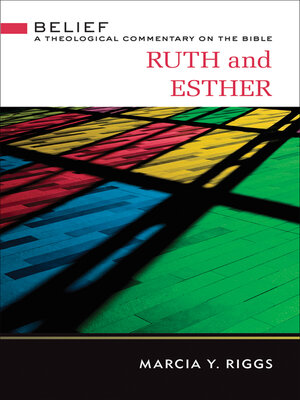
Sign up to save your library
With an OverDrive account, you can save your favorite libraries for at-a-glance information about availability. Find out more about OverDrive accounts.
Find this title in Libby, the library reading app by OverDrive.



Search for a digital library with this title
Title found at these libraries:
| Library Name | Distance |
|---|---|
| Loading... |
Ruth and Esther theologically examines Ruth and Esther as moral agents who overcome gendered violence with moral courage and imagination.
In this volume of the Belief commentary series, Marcia Y. Riggs brings a womanist, social-ethical reading of the books of Ruth and Esther to reveal the intersection of various forms of gendered violence—social, political, ethnic, economic. Riggs insightfully invites readers to examine how Ruth and Esther are social actors and moral agents responding constructively to gendered violence in their contexts, and she offers historical and contemporary examples of gendered violence to juxtapose with the experiences of Ruth and Esther. In the process, readers are inspired to ask who are the Ruths and Esthers in our society. How is the church responding to the marginalization of these women? How are people of faith doing ministry in solidarity with the struggles of these women?
In all, this resource for preaching and teaching provides insights about faithful ethical responses to violence, encouraging readers to be in dialogue with biblical texts as they ask questions about their complicity with violence in our environments today.
|Ruth and Esther theologically examines Ruth and Esther as moral agents who overcome gendered violence with moral courage and imagination.
In this volume of the Belief commentary series, Marcia Y. Riggs brings a womanist, social-ethical reading of the books of Ruth and Esther to reveal the intersection of various forms of gendered violence—social, political, ethnic, economic. Riggs insightfully invites readers to examine how Ruth and Esther are social actors and moral agents responding constructively to gendered violence in their contexts, and she offers historical and contemporary examples of gendered violence to juxtapose with the experiences of Ruth and Esther. In the process, readers are inspired to ask who are the Ruths and Esthers in our society. How is the church responding to the marginalization of these women? How are people of faith doing ministry in solidarity with the struggles of these women?
In all, this resource for preaching and teaching provides insights about faithful ethical responses to violence, encouraging readers to be in dialogue with biblical texts as they ask questions about their complicity with violence in our environments today.







